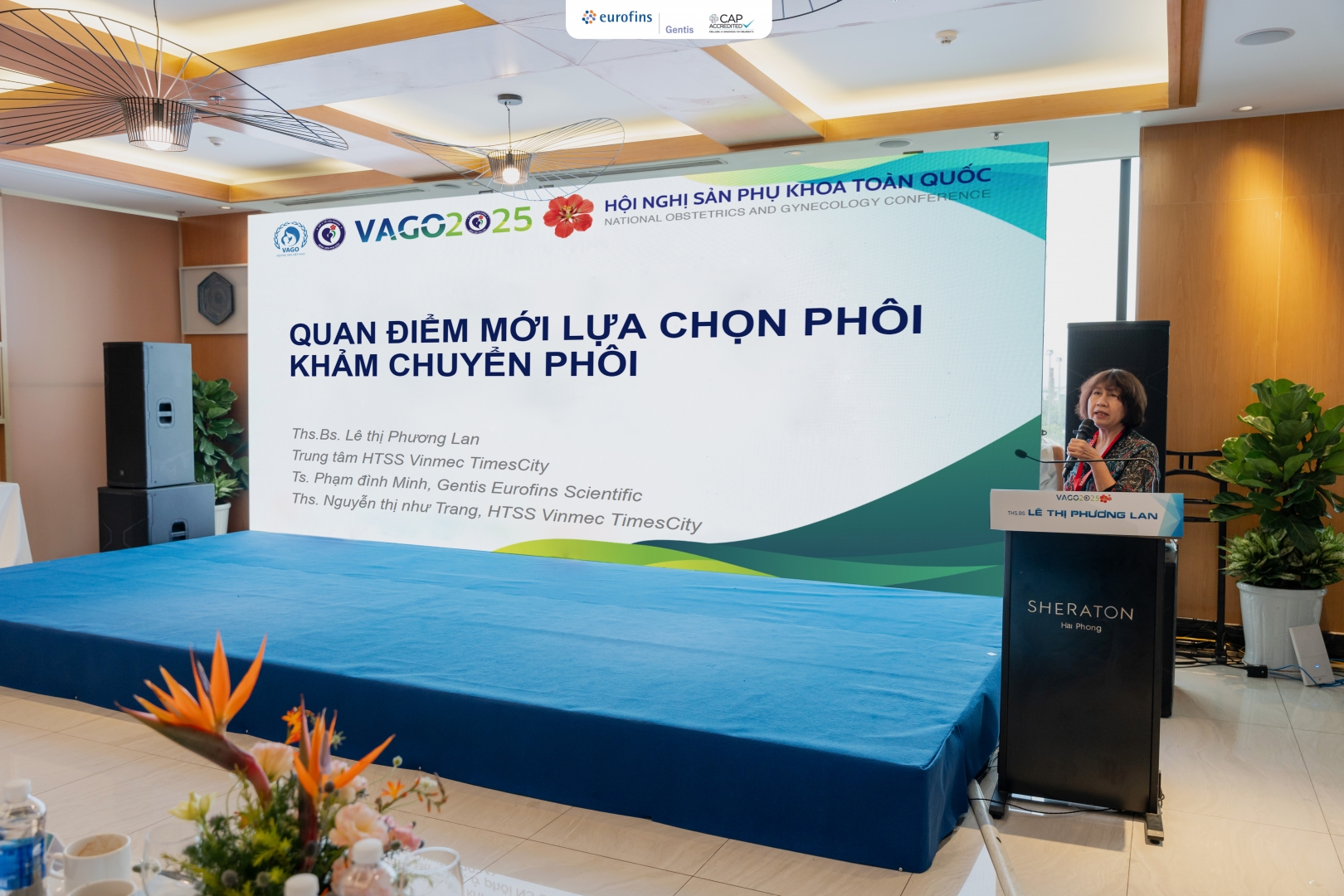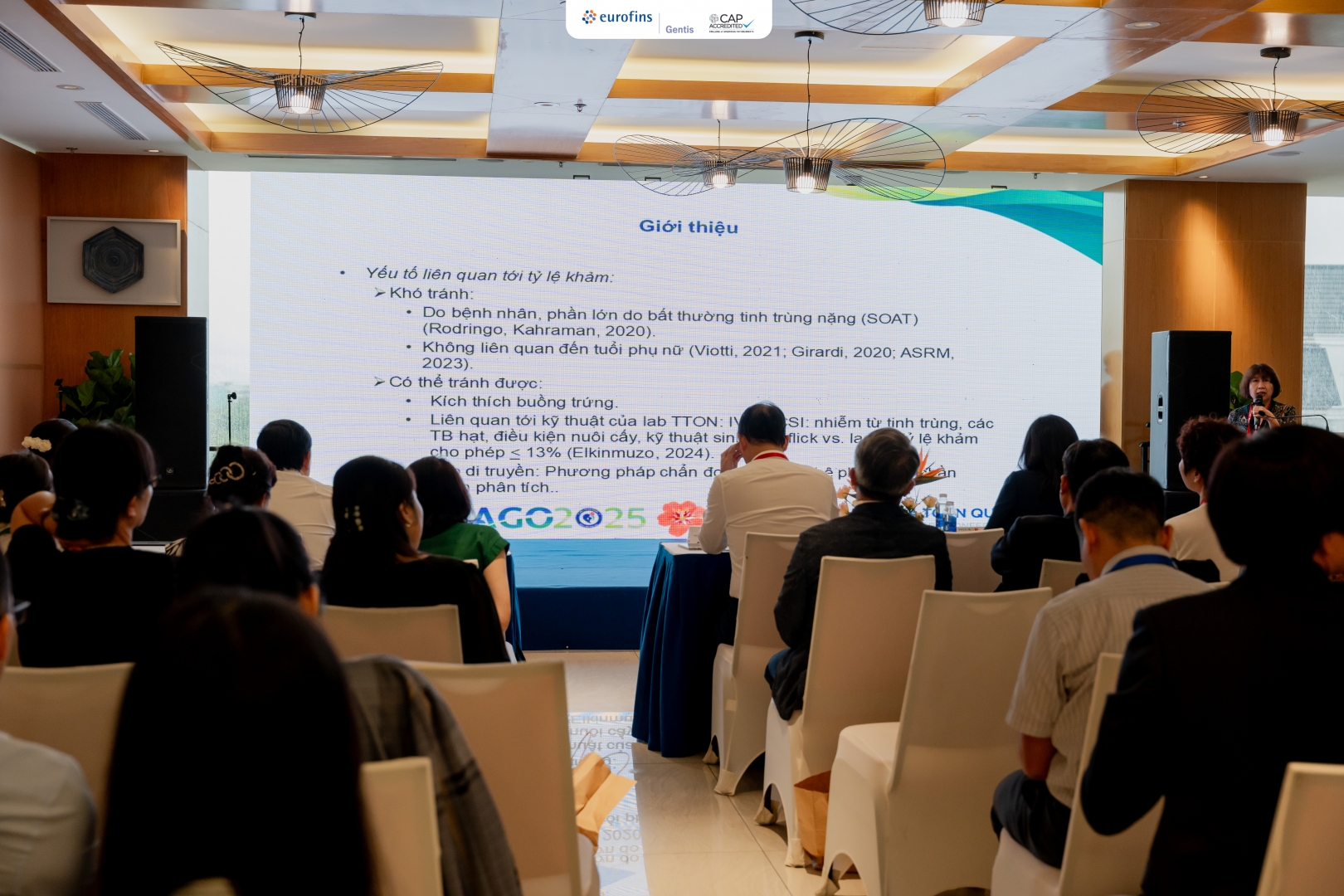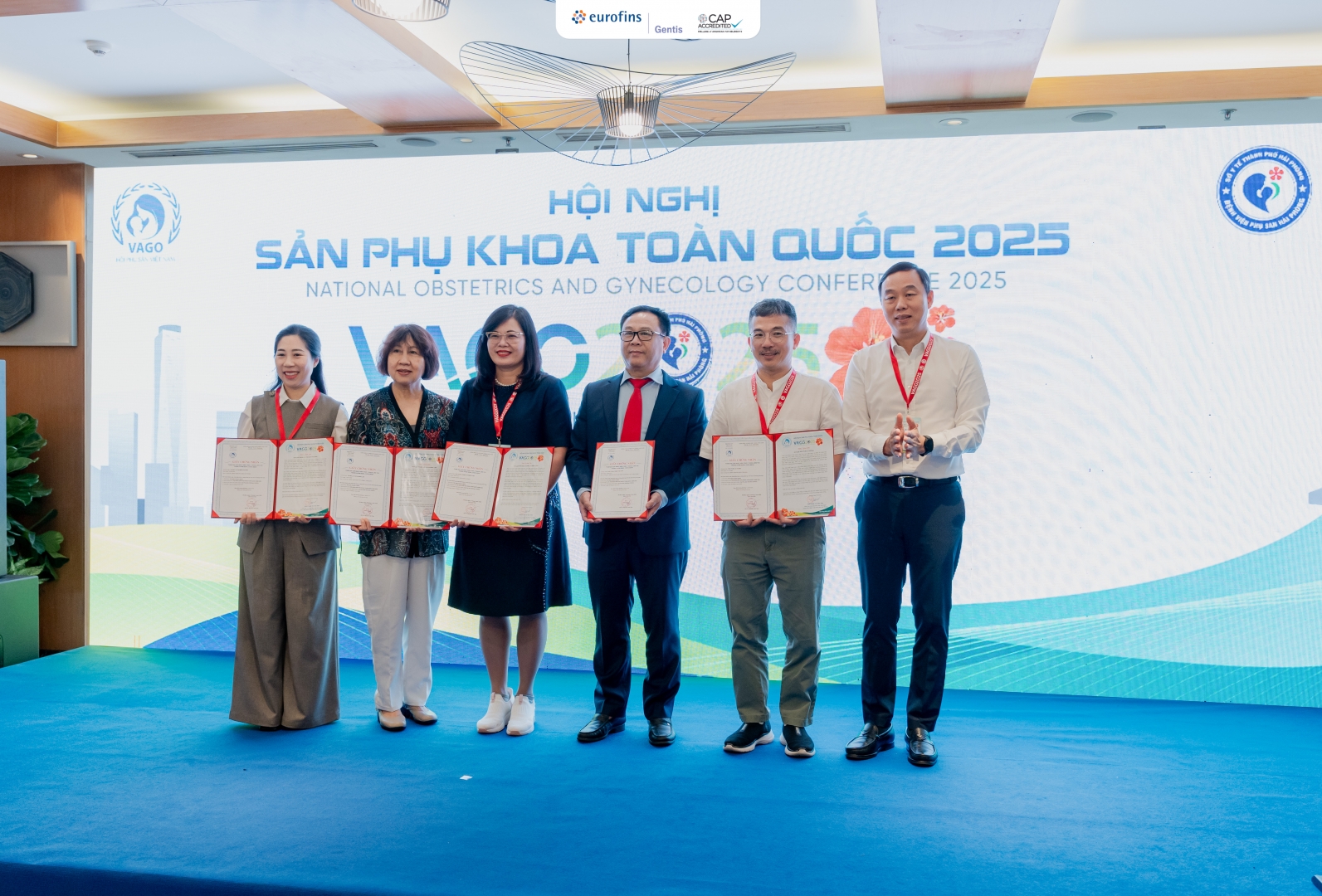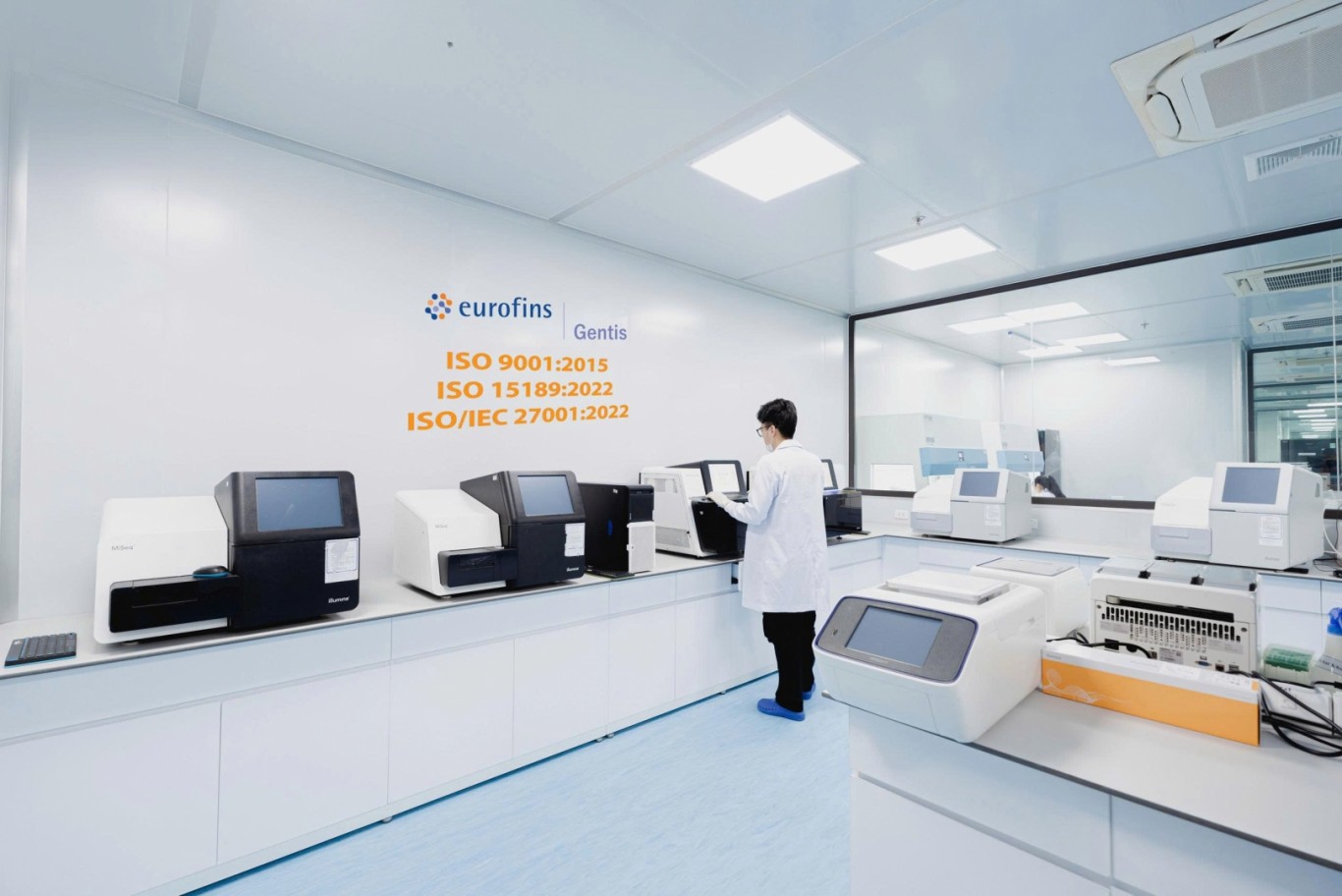With more than 50 scientific presentations delivered, VAGO 2025 served as an important scientific forum to update new advancements in the diagnosis, treatment, and reproductive healthcare fields. Key topics discussed at this year's conference included obstetrics, gynecology, gynecologic oncology, assisted reproduction, infertility treatment, and advanced techniques in reproductive medicine.

At the conference, GENTIS was honored to collaborate and provide data for the oral presentation by MSc. Dr. Le Thi Phuong Lan (Vinmec Times City International Hospital), titled: “New Perspectives on Selecting Mosaic Embryos for Transfer.” This was one of the key topics at the conference, attracting significant attention from experts in the field of assisted reproduction. The presentation was pioneering, offering updated perspectives on the approach to and handling of mosaic embryos—a subject previously surrounded by much controversy in reproductive medicine.
Mosaic Embryos – From Prejudice to New Opportunities in Embryo Transfer
According to MSc. Dr. Le Thi Phuong Lan, mosaic embryos refer to embryos containing two or more chromosomally distinct cell lines. Traditionally, these embryos were considered "unqualified" for uterine transfer due to the risk of implantation failure, miscarriage, or fetal abnormalities.
The earliest studies on mosaic embryos date back to 1993 (Delhanty – Day 3 embryos) and 1998 (Evisikov – Day 5 embryos). Statistics show the rate of mosaicism in Day 5 embryos ranges from 2–13%, compared to 2.1% in chorionic villus cells and only 0.2% in newborns.
The detection rate of mosaic embryos heavily depends on the diagnostic method used:
- FISH: screens 5–8 chromosome pairs
- a-CGH, a-SNP, and NGS: can screen all 23 pairs, with NGS (Next Generation Sequencing) being the most commonly used technique today
Mosaicism may lead to serious consequences such as implantation failure, spontaneous miscarriage, or abnormal fetal development. However, recent insights are gradually changing perspectives on the selection and use of mosaic embryos in embryo transfer.

Factors Influencing the Rate of Embryo Mosaicism
According to Dr. Phuong Lan, there are two main groups of factors influencing mosaicism rates:
- Unavoidable factors:
- Patient-related conditions, notably severe sperm abnormalities (SOAT).
- Interestingly, female age is not associated with mosaicism—this has been confirmed by recent studies (Viotti, 2021; Girardi, 2020; ASRM, 2023).
- Avoidable and improvable factors:
- Ovarian stimulation protocols.
- IVF lab techniques: conventional IVF tends to result in higher mosaicism rates than ICSI.
- Biopsy techniques (flick vs. laser), culture conditions, and embryologist expertise also play crucial roles.
According to current standards, acceptable mosaicism rates should be below 13% (Elkinmuzo, 2024).
In addition, the quality of the genetic lab is a critical factor. Diagnostic methods, technologies, and genetic data analysis software must meet high accuracy standards to deliver reliable results.
Real-World Study Opens New Pathways
Dr. Phuong Lan’s oral presentation highlighted a large-scale practical study conducted in collaboration between Vinmec International Hospital, GENTIS, and IRMET (Italy), led by Assoc. Prof. Francesca Spinella and colleagues. Conducted on 3,094 cases, this is one of the largest known studies on embryo mosaicism to date.
Key findings of the study include:
- Mosaic embryos can be transferred safely if the mosaicism rate is under 50%.
- The type of mosaicism (segmental, one chromosome, two chromosomes, or complex) also affects the decision to transfer.
- New selection criteria help utilize mosaic embryos that were previously discarded.
Dr. Lan shared: “Previously, mosaic embryos were thought to be abnormal and thus were not transferred. However, in reality, mosaic embryos have the potential to self-correct and can be transferred if they meet specific selection criteria.
Particularly, two key conditions must be met:
- A high-quality IVF lab with standard equipment, skilled personnel, and techniques that keep actual mosaicism rates below 13%.
- A genetic diagnostic center using modern technology like NGS, accurate data interpretation software, and the ability to make clinically sound decisions.”
This marks a significant advance in reproductive clinical practice, opening new opportunities for couples who do not have euploid embryos available for transfer.

GENTIS – A Pioneer in Genetic Analysis for Assisted Reproduction
As a trailblazer in the field of genetic testing, GENTIS constantly innovates and invests in advanced technologies to best serve the reproductive support needs in Vietnam.
GENTIS is one of the first institutions to implement PGT (Preimplantation Genetic Testing) in Vietnam and has achieved several prestigious international accreditations, including:
- CAP (College of American Pathologists)
- ISO 15189:2022 – Quality management for medical laboratories
- ISO 27001:2022 – Information security management
- ISO 9001:2015 – General quality management
With a team of experienced experts, internationally accredited laboratories, and cutting-edge technology, GENTIS continues to play a vital role in improving infertility treatment outcomes, helping thousands of families welcome healthy babies.
Reaffirming the Role in Research and Clinical Application
GENTIS's involvement in this scientific research not only demonstrates its technological and professional capabilities but also reflects its commitment to accompanying the medical community in finding breakthrough solutions to improve infertility treatment in Vietnam.
The genetic data and analysis provided by GENTIS significantly supported Dr. Phuong Lan's study and reaffirmed GENTIS's central role in bridging research and real-world clinical application.
Once again, GENTIS would like to congratulate the outstanding success of VAGO 2025 and sincerely thank the organizers for creating such a meaningful professional forum, contributing to the advancement of obstetrics and gynecology in Vietnam.











